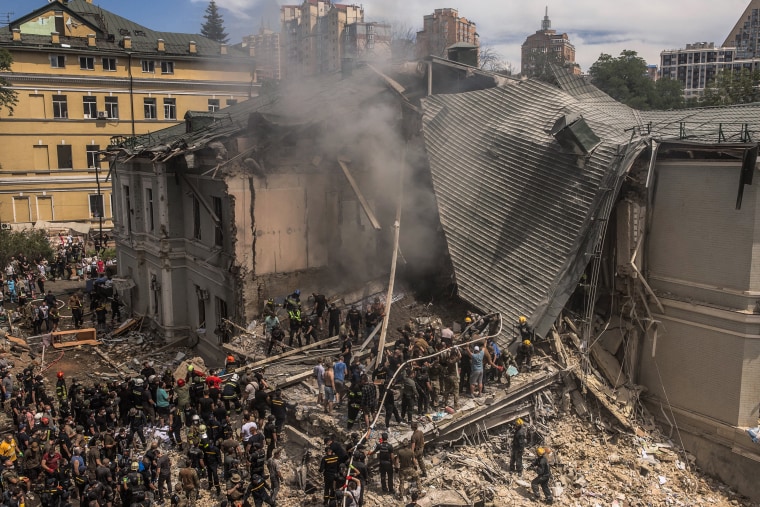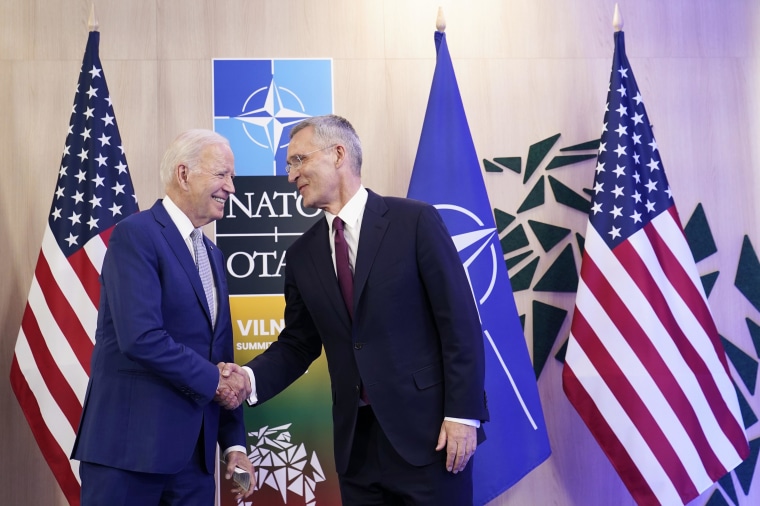As NATO leaders meet in Washington this week, Ukraine’s future is hanging in the balance.
Despite vows by alliance leaders to keep arming Ukraine in its fight to fend off invading Russian forces, the prospect of Donald Trump’s returning to the White House is casting a shadow over the summit.
A Trump victory in the November presidential election could mean a dramatic decline in U.S. aid to Ukraine and American political pressure on Kyiv to bow to Russian demands in any peace talks, Western officials say.
Trump has long avoided criticism of Russia’s invasion and questioned the value of the NATO alliance. His political allies have expressed skepticism about the large U.S. military aid packages provided to Ukraine.
Former national security aides to Trump have proposed a peace plan that would require major concessions from Ukraine, including forsaking the possibility of NATO membership for the foreseeable future.
Trump has offered no details about his position on Ukraine, other than to promise to bring the war to an end “before I even arrive at the Oval Office, shortly after we win the presidency.” But he has not explained how he would end the war.
On a June podcast, Trump was asked whether he would rule out Ukraine’s eventual membership in NATO. He replied that promising membership to Ukraine was a “mistake” and “really why this war started,” comments that seemed to echo Moscow’s talking points about the conflict.
In a statement, Trump campaign communications director Steven Cheung said, “President Trump has repeatedly stated that a top priority in his second term will be to quickly negotiate an end to the Russia-Ukraine war. President Trump believes European nations should be paying more of the cost of the conflict, as the U.S. has paid significantly more, which is not fair to our taxpayers. “
“The war between Russia and Ukraine never would have happened if Donald J. Trump were President. So sad.”
Republican Sen. JD Vance of Ohio, considered a possible running mate for Trump, has argued against sending tens of billions of dollars’ worth of weapons to Ukraine. In opposing the aid package Congress approved in April, Vance said that it would not be enough to shift the course of the war and that America’s defense industry could not produce enough weapons to meet Ukraine’s needs.
Trump’s campaign has said any policy proposals made by his supporters or former advisers are not endorsed by Trump.
European officials say exactly what Trump would do on Ukraine remains an open question, as his team has avoided offering any specifics about his plans. But they are worried.
The growing anxiety among European allies about a Trump victory is “completely understandable,” said John Herbst, a former ambassador to Ukraine and now a senior fellow at the Atlantic Council think tank. “Trump is something of a wild card.”
Ukrainian government officials seeking continued U.S. support have had to navigate a partisan minefield over the past year and have grown frustrated that the issue of arming Kyiv has become a pawn in America’s domestic politics.
They have viewed the Biden administration’s approach as too slow and too cautious, delaying the arrival of badly needed weapons. But they also fear what a second Trump presidency could mean for their cause, Western officials say.
For Kyiv, Trump’s plans are a mystery, said William Taylor, a career diplomat who was ambassador to Ukraine under President George W. Bush and briefly charge d’affaires in Kyiv under Trump.
“They’re not entirely sure — no one is really sure — what former President Trump would do,” said Taylor, now with the U.S. Institute for Peace think tank.
Congress adopted the military aid package in April after months of delay, with a group of pro-Trump Republican lawmakers blocking its approval. But when Congress finally voted on the proposal, Trump did not weigh in publicly. Senate Minority Leader Mitch McConnell, R-Ky., credited Trump’s public silence with helping get the aid across the finish line.
A majority of Americans continue to support arming Ukraine, according to a new survey from the Ronald Reagan Presidential Foundation and Institute, with 57% in favor, 32% opposed and 11% unsure. The poll results were nearly identical to those of a survey conducted a year ago.

Although Ukraine has been able to blunt a major Russian offensive near Kharkiv with weapons from the U.S. and European countries, its troops are outnumbered by Russia’s large ground force, and it is struggling to maintain its air defenses against a relentless Russian bombardment of missiles and drones.
On Monday, Russia launched the heaviest aerial attack on Kyiv in four months, striking a children’s hospital in the capital and other targets across the country, killing dozens of people and injuring more than 120, officials in Ukraine said.
To help Ukraine defend itself, NATO member states are prepared to pledge this week to keep spending about $43 billion a year on military equipment for Ukraine, NATO Secretary-General Jens Stoltenberg said last week.
“I expect allies will decide at the summit to sustain this level within the next year,” Stoltenberg told reporters.

The Biden administration and other European governments are expected to make announcements at the NATO summit this week about new military hardware for Ukraine, including possibly more Patriot missile defense systems, fighter jets and other weapons.
As for Ukraine’s future security arrangements, U.S. and European officials say they hope to hammer out a statement at the summit promising an “irreversible” path to NATO membership for Kyiv.
But that language may not be enough to secure Ukraine’s place in the NATO alliance if Trump is elected, said Tamar Jacoby, the Kyiv-based director of the New Ukraine Project at the Progressive Policy Institute think tank.
“If you want to be in the West, you have to be tied to the West, and indeed, you have to be ultimately protected by the West. And so, in a way, NATO membership is the most important thing that Ukrainians are fighting for,” Jacoby said.
NATO countries should adopt a binding measure that would guarantee Ukraine’s eventual membership in the alliance, to protect Ukraine after any possible armistice negotiated between Kyiv and Moscow, she said.
“If ever there was a time to Trump-proof a path into NATO for Ukraine, this would be the moment,” Jacoby said.
